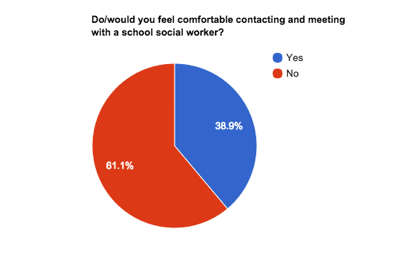Social workers must communicate

February 24, 2017
While social workers intend to help students, lack of communication can cause tricky situations.
Students should always seek help when struggling with emotional or mental issues. Social workers work hard to help everyone, attending to approximately 500 students per year.
“It was such a professional environment and I felt more supported than I ever have with therapists outside of school,” an anonymous student says.
While these incredible resources have helped many people through difficult circumstances, there is still room left for improvement.
“There was a day when I said I was feeling hopeless,” another anonymous student says. “I told them I wasn’t in danger; it was just an emotion, but I was sent to the hospital anyway.”
There is a fine line between what is simply a reflection of someone’s mood and a call for help.
Lead social worker Martha Zarate-Ortega explains that all social workers have been trained to complete a risk assessment. While they might not always be correct in their assessments, the student’s safety is top priority. The problem is that being sent to the hospital based on a false assessment may make the students feel reluctant about attending future meetings. Students may fear facing a second false assessment and therefore may not be so inclined to share future details with counselors.
It is important that social workers thoroughly communicate with students. Students should have a complete understanding of why social workers would have to send them to a hospital, directing them to a second source for further help or contacting their parents/guardians.
Furthermore, social workers should emphasize all the possible outcomes of the sessions during a first encounter. Zarate-Ortega explains that the social workers don’t abide by a specific set of rules, but the National Association of Social Workers (NASW) enforces a code of ethics they follow. These ethical practices include informing students about the possibility of parental involvement. Social workers only break confidentiality if a student has shared that the potential of harming themselves, someone harming them or the consideration of harming others. However, students have reported missing information about confidentiality that can later cause damage.
“I thought I was in a safe space,” the student says. “It was less about my life and my safety and more about the procedure.”
As soon as the student confided in their social worker, however, the expert disclosed the problem to their parents. Full disclosures to the student about the routines social workers follow regarding confidentiality can save family situations from becoming uncomfortable or even intolerable. Students should never face what feels like betrayal.
For many, the social workers have already created wonderful experiences in comfortable environments. In order to produce the maximum number of successful sessions, social workers should continue to consider what they tell students. As young adults, they deserve the entire truth. In return, students should communicate their concerns about social workers.








